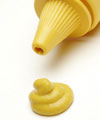Yellow or white mustard (Sinapis alba L.) is best known in North America as the main ingredient in hot dog mustard. However, yellow mustard is unique in the mustard family because it contains large amounts of a mucilage or gum on its seed coat. For example, the gum in yellow mustard accounts for 5% of the seed compared to less than 1% for brown, black and oriental mustards.
Mustard gum contains a complex mixture of polysaccharides that can be readily extracted from the seed or seed coat by water at elevated temperatures. It is this gum that gives mustard its unique thickening, water binding and emulsifying properties, which are crucial to the production of salad dressings, mayonnaise and prepared meats.
Studies conducted at the University of Manitoba over the past decade have highlighted the unique shear thinning flow behavior of this gum. More recent work has found that yellow mustard gum interacts with galactomannans and plant starches, enhancing rheological properties, as well as reducing synerresis and retrogradation of starches.
Recently I examined the possible anti-cancer properties of yellow mustard gum in collaboration with Dr. Ranjanna Bird and Dr. Jayadev Raju at the University of Waterloo. Using Dr. Bird’s unique animal model for studying colon cancer, which has been adopted by many researchers, we found the gum to possess potent anti-cancer effects.
Over one million new cases of cancer are reported in the U.S. annually, with colon cancer the third most frequently diagnosed form. Colon cancer is the second leading cause of mortality among men and women.
Our study evaluated the ability of the gum to inhibit cancerous changes in animal models of sporadic and obesity-associated colon cancer. Animals were injected with a specific colon carcinogen, azoxymethane, to develop the precancerous lesions (known as aberrant crypt foci or ACF) with one group in each model fed 5% yellow mustard gum.
A significant decrease of 50-60% in the number of large and precancerous colonic ACF were found in both groups fed the 5% gum. ACF are the earliest, morphologically recognizable colonic lesions-they possess cellular and molecular features supporting their preneoplastic lesions. ACF are also present in human colons with high risk for developing colon cancer. These lesions grow at different rates depending on the host’s physiological state and do respond to tumor promoters as well as inhibitors.
Zucker obese rats exhibit metabolic “Syndrome X” and are highly sensitive to colon cancer. Therefore, the yellow mustard gum was found to be more effective in retarding the growth of ACF in the Zucker rats than in other rat models, including Sprague Dawley rats or lean counterparts.
The colonic epithelium of Zucker and lean rats were also assessed for proliferating cell nuclear antigen (PCNA) using immunohistochemical staining. It was noted that the PCNA expression, a marker of cell proliferation was not affected by mustard gum in normal appearing crypts in the obese, as well as in lean rats. This observation lead the authors to propose that the effect of gum is selectively exerted on the preneoplastic stages.
Yellow mustard oil, which belongs to the Brassica family, is known to exert therapeutic benefits. In the present study, we found the mustard gum derived from the mustard to exert potent anti-cancer properties.
This is the first study to test the ability of this gum to modulate ACF in pre-clinical models. These results will be published shortly in the peer reviewed journal Phytomedicine, and will demonstrate for the first time the protective role this novel yellow mustard gum plays in the development of colon cancer. Additional studies are planned to gain further insight into the underlying mechanism(s) of action.



